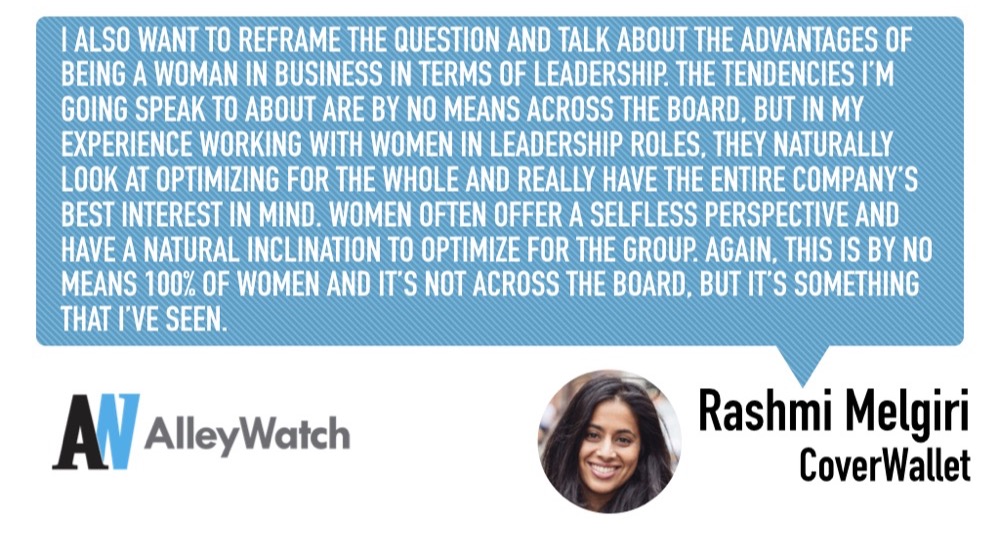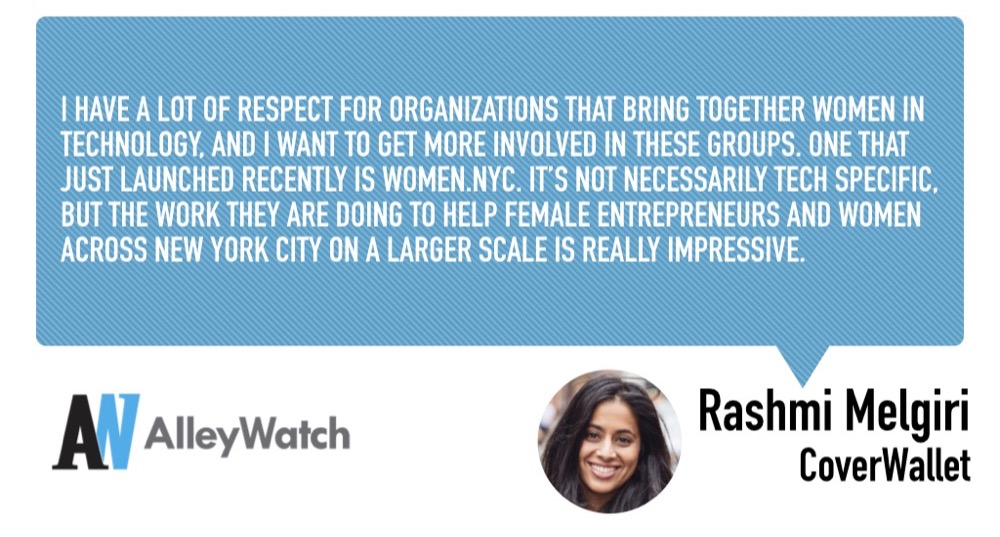Are you a woman in NYC Tech and interested in participating in this series? Make sure to read the whole article…
Much has been said and written about the lack of women in the tech sector, be it as investors (or associates), founders, or in management positions at major companies. Is the problem the old boys’ network – or that success in technology is seen as a young man’s game? In this series, we speak with some of the top women in tech in New York as they discuss the challenges they face, the perceptions that need to be changed and the work that’s being done – or not – to help to promote women in tech.
Today, we speak with Rashmi Melgiri, cofounder of CoverWallet, the data-powered, online insurance management platform for small businesses. Before founding the company in 2015, Melgiri primarily worked in management consulting focused on TMT. For her work at CoverWallet, she was recently named to the 2018 Crain’s New York 40 under 40 list and CoverWallet is thriving, having raised more than $35M in funding from top tier investors that include Union Square Ventures, Index Ventures, Two Sigma, and Foundation Capital. Melgiri received both her undergrad degree and MBA from MIT and is extremely active in the MIT community, speaking at numerous events including the StartMIT conference, which enables innovative MIT alumni to help guide student entrepreneurs.
AlleyWatch sat down with Melgiri to hear how she is forging her own path as a woman in tech in the city.
Rashmi Melgiri, CoverWallet
What’s your background and how did you develop your career as a female entrepreneur in the NYC tech ecosystem?
I received both my undergrad degree and my MBA from MIT, and my background is largely in management consulting. After six years of thinking about strategies for telecom and media companies, I got an itch that I wanted to launch something more operational and go from there. I wound up getting in touch with a good friend of mine from business school, and we started kicking around the idea of creating something together. That was in 2015 and ultimately the start of CoverWallet.
At the time, we both lived in New York City, so it was a very natural place for us to begin. It’s a great ecosystem for tech and entrepreneurship. As the capital for finance and with so many insurance companies, it’s also been very beneficial for us to be here from that standpoint.
In terms of my role in the ecosystem, I’d like to explore more of the ways I can give back and help women in tech. Given my experience and the platform I have as a cofounder, it has me thinking a lot about what I can do.
What are the advantages of being a woman in tech?
There aren’t many women in tech leadership positions today. As a result, you get highlighted more frequently and gain the exposure that male tech leaders don’t always get. I don’t know if it’s necessarily an advantage, but I think it’s important that as women we have the ability to share our experiences so that other women can learn from them.
I also want to reframe the question and talk about the advantages of being a woman in business in terms of leadership. The tendencies I’m going speak to about are by no means across the board, but in my experience working with women in leadership roles, they naturally look at optimizing for the whole and really have the entire company’s best interest in mind. Women often offer a selfless perspective and have a natural inclination to optimize for the group. Again, this is by no means 100% of women and it’s not across the board, but it’s something that I’ve seen.
Now, on the other hand, I think this can also hurt women in business. They often times won’t negotiate for themselves, and we see that with things like the wage gap. So I think there are pluses and minuses to that mentality.
What can be done to further promote female entrepreneurs and women in tech in New York?
I think a lot of this is happening right now, and it’s an incredibly exciting time for women in tech and women in general. I think women like myself need to be out there participating in the conversation, networking and sharing our experiences. Those who are-up-and-coming should also reach out, get mentorship and speak with women who have already gone on similar paths. There is a lot we can learn from each other.
I also think it doesn’t have to be about just women. Building a group of allies and tapping into a network of men who see the value women bring to the tech and business world is also key. At the end of the day, it’s about building a community of people who want to see a more equitable split of leadership in the NYC tech community and recognize the value that creates.
What is diversity to you and do you see it evolving in tech?
Diversity to me is more about diversity of thought and approach than diversity of gender, race and age – although I tend to think that those things often help bring diversity of perspectives.
I think it really is evolving in tech, especially with the consumer experience. Today, it’s more and more important that you have an empathetic team that understands what consumers are like. In order to that, you have to have a diverse team that represents many different points of views.
All that being said, I think that almost every situation in the world where we tend to see one group dominate over and over again – whether it’s men in leadership positions or non-minorities – is really an issue of pattern recognition. In the past, men tended to have positions of power and when people were looking to fill those positions, men were often top of mind. At some point, we have to open our eyes and look at merit rather than what predecessors have looked like in the past.
 Why do you think it’s important that women retain, grow, and develop into senior roles within their organizations?
Why do you think it’s important that women retain, grow, and develop into senior roles within their organizations?
I think this is important at an individual level. Each woman needs to decide what her life is going to look like. I’m not going to make a blanket statement that every woman should grow and develop into a senior role within an organization. That is a choice for every woman to make on her own in terms of the way she wants her life to look.
The only blanket statement I will make is that once you have decided the way you want your life to look, don’t get taken out by anything. If you’ve decided to be at a certain level within an organization then you make it your business to get there. And at the same time, if you decide you want to work to a certain point and then you want to retire, or you don’t want to work and you want to have a family and stay at home, that’s your choice too. Decide what you want, go after it and don’t let anyone else tell you how it’s going to be.
You’ve successfully raised funding for your business from investors. What tips do you have for fellow female founders?
This is a tip for any founder, regardless of gender. Just be yourself. At the end of the day, investors aren’t just investing in an idea or execution – they are investing in the team. Nothing sells like authenticity. Be who you are, 100% of the time. If you do that, care about the business, and do everything you can to make it work, then it will happen. The right things will fall into place.
Do you think fundraising for your business would be more difficult if you did not have a male cofounder?
That’s an interesting question. I’ve had a unique experience. I’m a first-time founder and this is my cofounder’s third company. He has a very successful track record with past companies, so I don’t think the success we had with fundraising was so much to do with him being male as it was to do with his experience.
With that, I really couldn’t tell you what the counterfactual experience would have been like. I think there was something investors saw in us as co-founders. We are stylistically very different, and that hybrid approach can lead to a lot of success in terms of how a company is managed and built. I think this worked well for us.
It’s statically proven that women-led companies are more successful than their male counterparts. Why do you think they still only get 2% of funding available for new ideas?
This is a difficult question to answer, and I don’t want to suppose anything. For anyone raising money, it really has to be focused on the sell. Are you successfully selling to the audience you are talking to? Is the pitch aligned with the audience? Are the founders aligning to the investors? If all that is aligned and it’s a strong sell, and still it’s only 2% of funding, then I think it will evolve.
How much do you think casual sexual harassment and misconduct affects a woman’s career?
This can affect a women’s career quite a bit. I went through some of this in my 20s in my first job out of college, and it’s really impactful, especially when it happens early in your career. It shapes your view of corporate America and the way that businesses react to these sorts of claims. Do women who speak up advance or are they punished?
I think times are changing now, but it really impacts you. Male or female, the environment of your early jobs is your first exposure to corporate America and those experiences teach us the way the work world operates. Whatever you learn is how you adapt and become a worker.
To the extent that you have that sort of situation happen to you and you have a company that is supportive and does the “right thing,” perhaps it leads to a more positive experience. Obviously, not the initial incident, but the fact that you could work within a corporate structure that cared would shape you in a better way. To the extent that you worked in a corporate culture that buried it or
encouraged you not to say anything, then you may have learned the way to get ahead was to behave a different way.
So I think it’s incredibly impactful, not just with how you progress within an organization but actually shaping your mindset for what proper behavior is and who gets awarded with the system.
Please tell us about a few organizations that you are involved with or respect that are promoting women in tech.
I have a lot of respect for organizations that bring together women in technology, and I want to get more involved in these groups. One that just launched recently is Women.nyc. It’s not necessarily tech specific, but the work they are doing to help female entrepreneurs and women across New York City on a larger scale is really impressive.
I think Girls Who Code also continues to do great work to get more girls interested in computer science and technology. It’s geared to middle school and high school girls, and I think it’s especially important to expose them to mentors and skills before they enter the workplace.
What can men do to support this movement and/or participate in this discussion?
It is critical that men be willing to be part of the conversation – that’s it.
As women, we have to include men in the conversation and be willing to speak up when we see behavior that might not be conscious. For example, if you see specific policies that have a second order effect of limiting women’s professional growth, a supervisor that is somehow preventing someone from progressing, or a manager that is constantly asking a woman to be a note taker for a meeting even when male counterparts are there, we (women) have to be willing to say something and start the conversation.
Men can support this by listening, participating, and being willing to make a change. In my experience, nine times out of ten, women and men in positions of power are open to feedback and they just don’t realize what they are saying or doing has a negative impact. Until we make the unconscious conscious, we can’t take action on it. It’s important that women take the lead in starting the conversation.
The team at AlleyWatch believes it’s important to have an inclusive discussion around the challenges facing women in tech along with highlighting the work of the female entrepreneurs that have made NYC one of the best places for women in tech according to some recent studies. That’s why we are running this series that showcases women in tech in New York.
If you are a female founder in NYC working in tech and interested in participating in the series please visit this link or click on the image above.
Please feel free to pass this on to any women in NYC that you feel should be considered for the series. Thank you!







